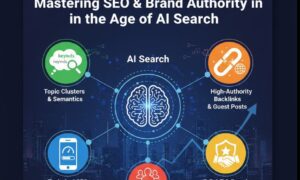In the ever-evolving world of digital marketing, SEO (Search Engine Optimization) remains a cornerstone for online success. As search engines become more intelligent and user-centric, the old tactics of keyword stuffing and shallow backlink building are no longer effective. Instead, businesses and marketers are turning toward a more comprehensive and sustainable approach known as Holistic SEO.
This article dives into what SEO means today, why a holistic strategy is critical in 2025, and how you can start implementing it to improve your online visibility.
What is SEO?
SEO stands for Search Engine Optimization, a digital strategy that focuses on improving a website’s ranking in search engine results pages (SERPs). Higher rankings mean more organic traffic, which often translates into better leads, conversions, and sales.
Traditional SEO focuses on three main pillars:
- On-page SEO – Optimizing content and HTML source code.
- Off-page SEO – Building high-quality backlinks.
- Technical SEO – Ensuring a website meets the technical requirements of search engines (e.g., fast load times, mobile optimization, structured data).
But as Google’s algorithms evolve, so must our strategies.
Why Traditional SEO Alone Isn’t Enough
Years ago, ranking on Google was largely about targeting the right keywords and acquiring backlinks. Today, it’s about user experience, content quality, trustworthiness, and relevance.
Here are a few reasons why relying only on traditional SEO methods won’t cut it anymore:
- Search engines prioritize user intent over keyword density.
- Core Web Vitals now affect rankings directly.
- E-E-A-T (Experience, Expertise, Authoritativeness, Trustworthiness) plays a crucial role in content evaluation.
- Voice search, AI-generated results, and zero-click searches are becoming increasingly common.
To succeed, websites need an SEO strategy that considers the entire user journey, not just search rankings. That’s where Holistic SEO comes in.
What is Holistic SEO?
Holistic SEO is a comprehensive optimization approach that considers every aspect of your website and brand—technical performance, content quality, user experience, and even brand trust.
Instead of focusing on just keywords or backlinks, Holistic SEO ensures your site provides real value to users. This includes:
- Creating relevant, original, and useful content
- Ensuring top-notch page speed and mobile-friendliness
- Building natural backlinks through genuine authority and content excellence
- Improving site structure and navigation
- Strengthening brand signals across digital platforms
By addressing SEO from a complete, integrated perspective, Holistic SEO aligns with how search engines actually rank content in 2025 and beyond.
For a deeper dive into how this strategy works, visit Holistic SEO to see real-world applications and insights.
Benefits of a Holistic SEO Strategy
- Better User Experience
A seamless, well-structured website keeps users engaged and reduces bounce rates—key indicators Google uses to evaluate content quality.
- Long-Term Results
Unlike black-hat SEO tactics that offer short bursts of traffic, holistic SEO builds sustainable growth through ethical, user-centered practices.
- Improved Brand Authority
Holistic SEO builds trust not just with search engines but also with your target audience. High-quality content and a strong UX foster loyalty and credibility.
- Future-Proof Against Algorithm Updates
By focusing on overall quality rather than gaming the system, holistic SEO makes your site more resilient to algorithm changes.
- Enhanced Conversion Rates
Optimizing user experience and intent alignment increases the likelihood of conversions, whether that’s sales, leads, or sign-ups.
Key Components of Holistic SEO
1. Content That Solves Problems
Go beyond keywords. Write with the user’s intent in mind. Content should answer questions, solve problems, and provide value beyond what competitors offer.
2. Technical Excellence
Ensure fast loading speeds, responsive design, proper indexing, and no broken links. A technically sound site creates a smoother experience for users and search engines alike.
3. Mobile and Accessibility Optimization
With the majority of users browsing on mobile devices, responsive design and accessibility for all users (including those with disabilities) is essential.
4. Natural Link Building
Instead of chasing backlinks, attract them through high-quality, shareable content, digital PR, and partnerships.
5. Brand & Trust Building
Enhance your brand’s visibility across platforms. Build trust through verified author profiles, customer testimonials, and transparent business practices.
How to Get Started with Holistic SEO
- Audit Your Site: Analyze your current performance using tools like Google Search Console, Ahrefs, or Screaming Frog.
- Understand User Intent: Dive deep into your audience’s needs. Use tools like AnswerThePublic or Google Trends to identify key questions and pain points.
- Create a Content Strategy: Focus on quality, relevance, and depth. Create pillar content and support it with related articles.
- Invest in UX: Streamline your website’s design and navigation to enhance user engagement.
- Monitor and Adapt: SEO isn’t a one-and-done project. Regularly track performance and adjust strategies as necessary.
Final Thoughts
SEO has matured far beyond simple keyword optimization. In 2025, winning in search means thinking bigger—about your users, your content, and your brand. Holistic SEO is more than just a method—it’s a philosophy that puts people first and search engines second.





























